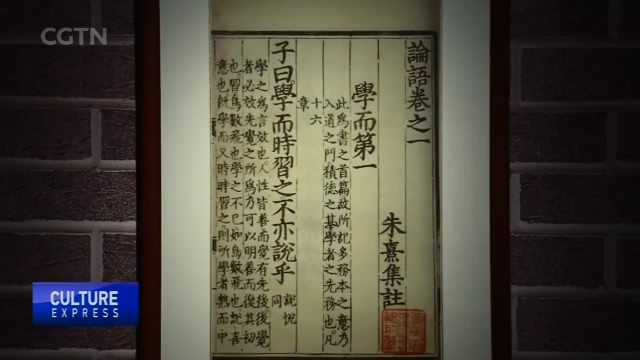
20:30, 26-Apr-2018
Traces of the Sage: Exhibition highlights life and legacy of Confucius
04:02

And back here in Beijing, an exhibition about Confucius, the great Chinese philosopher who lived during 6th century BC, is currently on display at the National Library of China. Through 23 artifacts, the exhibition focuses on the life, teachings and influence of Confucius, who has become increasingly synonymous with Chinese culture.
For centuries, no one has influenced more people in China than Confucius.
Now, an exhibition at the National Library of China puts the spotlight on different aspects of the great philosopher's life, including his teachings and belief system.
It starts with "Traces of the Sage", one of the earliest picture-story books in China. It's a biography of the Confucius, and attributes supernatural qualities to him, including the ability to communicate with cosmic forces.
TANG LI, RESEARCHER CONFUCIUS MUSEUM "'Traces of the Sage' was created during the Ming Dynasty around 600 years ago. It's fortunate that the album has been handed down from Kong's family and well protected by Confucius' descendants."
For hundreds of years after Confucius' death, emperors from many dynasties went to his hometown of Qufu in southwestern Shandong Province, to offer sacrifices and show their commitment to Confucian ideals of governance and learning.
The calligraphy work "Commending Scroll on the Palace Wall" was written by the Qianlong emperor of the Qing Dynasty, on one of his eight visits to Qufu. The emperor expressed that he had studied Confucius' teaching since childhood, but still couldn't fully comprehend the essence of his ideas.
The authoritative books of Confucianism are called the "Four Books" and the "Five Classics". They became the core curriculum of Chinese literati throughout the imperial period. The "Four Books" are Chinese classic texts illustrating the core value and belief systems of Confucianism.
A woodblock-printed edition of the "Four Books" dating back over a thousand years is on display at the National Library exhibition.
LIN SHITIAN CHINA PROTECTION CENTER OF CLASSIC BOOKS "In this woodblock-printed book, there is an illustration depicting a scene of Confucius lecturing his disciples in apricot woods. It became a very famous picture, and has been widely used in China ever since."
All of the items being featured in the exhibition are on loan from the House of Confucius in Qufu. It's the first time many of these artifacts are being exhibited outside the House of Confucius.
As part of the exhibit, the National Library has also invited renowned professors and researchers to give lectures. Many of them say that Confucius's ideas still resonate with people today.
LOU YULIE, PROFESSOR PEKING UNIVERSITY "Confucius's core philosophical ideas are the importance of a virtuous life, filial piety and ancestral worship. He also emphasized the importance of inner moral harmony, and its direct connection with harmony in the physical world. The revival of Confucianism is important for the prosperity of Chinese civilization."
Confucius' teachings centered on humanity and adaptability, two things that are more important than ever in today's rapidly changing world.

SITEMAP
Copyright © 2018 CGTN. Beijing ICP prepared NO.16065310-3
Copyright © 2018 CGTN. Beijing ICP prepared NO.16065310-3